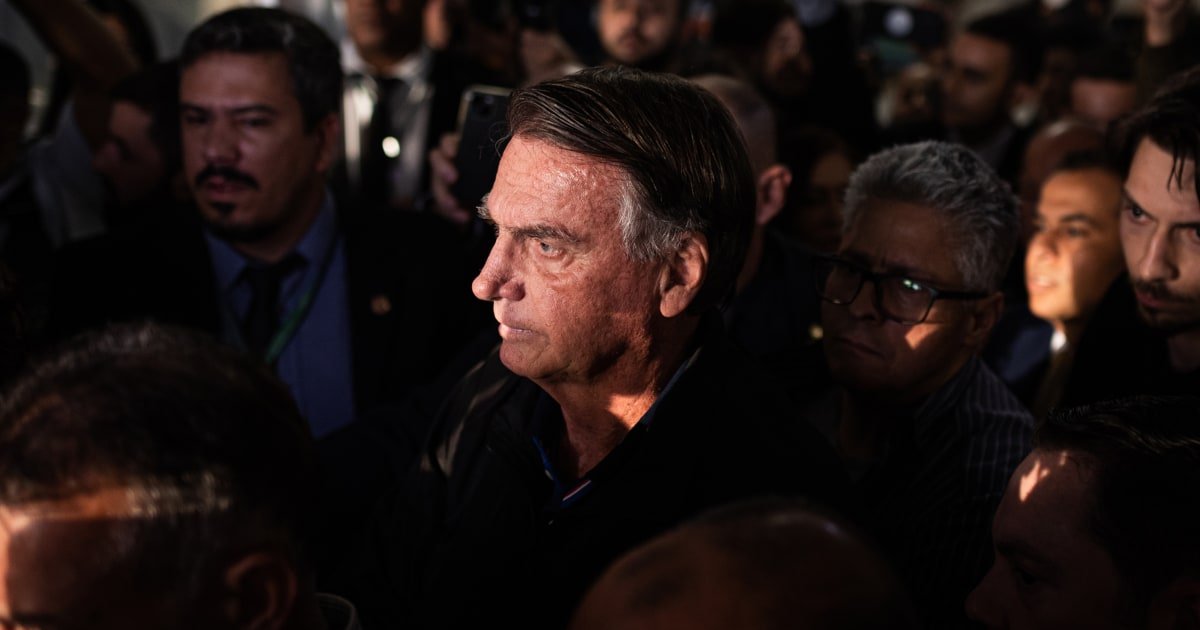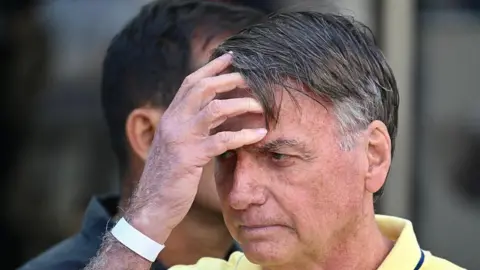Top Stories
Who is the ‘Phillies Karen’? How the viral drama over a home run ball unfolded — and what the dad and his son have said about it

A father who was berated by a woman in a Philadelphia Phillies jersey into giving up a home run ball he had grabbed for his son is speaking out about the incident as online sleuths continue to search in vain for the identity of “Phillies Karen.”
“I pretty much just wanted her to go away,” Drew Feltwell told NBC Philadelphia on Saturday, a day after his altercation with the woman went viral. “Still in disbelief that she walked down there like that.”
Feltwell, a Phillies fan from New Jersey who now lives in West Palm Beach, Fla., was attending Friday night’s game between the Phillies and Miami Marlins in Miami with his wife and two children.
The Feltwell family was in the left field stands in the top of the fourth inning when Phillies center fielder Harrison Bader hit a home run that landed near them.
What happened next?
Philadelphia Phillies center fielder Harrison Bader celebrates with his teammates after hitting a home run against the Miami Marlins on Friday in Miami. (Sam Navarro/Imagn Images)
Several fans, including Feltwell, scrambled to find the ball. He grabbed it, turned, walked back to his family, gave his son Lincoln the ball and hugged him.
“I was already ecstatic, like I got Bader’s home run ball, and I get to put it in my son’s glove,” Feltwell recalled. “Then here she comes.”
Video posted to social media shows a woman approach Feltwell as he was embracing his son and angrily demand that he give her the ball.
“She just screamed in my ear, ‘That’s my ball,’ like, super loud,” Feltwell said. “I jumped out of my skin and I was like, you know, like ‘Why are you here?’ You know, ‘Go away.’”
After a brief exchange, Feltwell took the ball from his son’s mitt and gave it to her, and she walked away.
Feltwell said he decided to diffuse the situation before it could escalate.
“I had a fork in the road: either do something I was probably going to regret or be dad and show him how to deescalate the situation,” Feltwell said. “So that’s where I went.”
“I wasn’t very happy that we had to give it to her,” added Lincoln, who will soon turn 10. “But we can’t win.”
A representative for the Marlins gave Lincoln a goodie bag.
After the game, Bader met with the family and gave Lincoln a signed bat.
The altercation over the home run ball came just days after a similar scene unfolded at the U.S. Open. In that incident, a man was caught on video taking a hat from a tennis player who was trying to give it to a young fan.
The man later apologized, saying he believed the player had intended to give the cap to him for his sons, who had earlier asked for autographs.
“That mistaken belief made me reach out instinctively,” Piotr Szczerek wrote in a post on Facebook. “Today I know I did something that looked like deliberately taking a souvenir from a child. That was not my intention, but it does not change the fact that I hurt the boy and disappointed the fans.”
The search for ‘Phillies Karen’

The woman in the Phillies jersey who berated Feltwell was later booed. (Phillies Tailgate/X)
Meanwhile, the woman in the Phillies jersey was also seen on video confronting another man seated in the left field stands who had apparently heckled her for her behavior.
She was booed when she returned to her seat and promptly flipped off the entire section.
As the video of her initial confrontation with Feltwell spread across social media over the weekend, online sleuths searching for the real “Phillies Karen” apparently misidentified her.
“OK everyone, I’m NOT the crazy Philly Mom (but I sure would love to be as thin as she is and move as fast),” Cheryl Richardson-Wagner posted on Facebook Saturday. “And I’m a Red Sox fan!”

Philadelphia Phillies outfielder Harrison Bader reacts after striking out in his next at-bat. (Marta Lavandier/AP)
A New Jersey school district also issued a statement saying that the woman in question does not work for the school system.
“The woman identified on social media as ‘Phillies Karen’ is not, and has never been an employee of the Hammonton Public Schools located in Hammonton, New Jersey,” the district said in a Facebook post. “Anyone who works for our school district, attended as a student or lives in our community would obviously have caught the ball bare-handed in the first place, avoiding this entire situation!”
Even if she is eventually identified, Feltwell said he does not expect an apology or for her to return the ball.
“That would still be hard for her to do,” Feltwell said.
The incident got so much attention across social media that it was even parodied by the Savannah Bananas, the Georgia exhibition baseball team, who likened the woman to the Grinch in a skit at a game over the weekend.
Top Stories
They want a COVID shot to protect their health or at-risk family. They can’t get it : Shots

Therese McRae with her daughter (left), Stephan Neidenbach (upper right, with his wife Jennifer, and their children) and Jason Mitton (lower right) all want the COVID vaccine and are having trouble getting it.
Therese McRae; Stephan Neidenbach; and Jason Mitton
hide caption
toggle caption
Therese McRae; Stephan Neidenbach; and Jason Mitton
Jason Mitton wanted one of the new COVID-19 vaccines before leaving on a business trip. But the pharmacists at a drug store near his home in Austin, Texas, refused.
“He’s like: ‘Do you have a doctor’s note?’ I said: ‘No, I don’t.’ He said: ‘Well, the FDA standards say that you don’t qualify. And our policy is that we won’t administer it unless you qualify,'” says Mitton.
Mitton, who’s 55 and says he has high blood pressure and high cholesterol that’s controlled by medication, plans to keep trying to get vaccinated.
“I think it’s ridiculous,” Mitton says. “I think it should be a person’s right to get the vaccine or not. So I’m very angry.”
The same goes for Cheryl Huges, 64, who lives outside Cleveland. She was planning to get another shot as soon as the updated versions became available. But, she’s not eligible.
“I’m furious,” says Hughes. “Who wants to get sick?”
For the first time, COVID vaccines aren’t available to anyone ages 6 months and older to obtain simply by walking into a pharmacy and asking to get inoculated.
In a major departure, the Food and Drug Administration only approved the shots for those at greatest risk for getting seriously ill from COVID because they’re at least 65 years old or have another health issue that makes them highly vulnerable.
Health and Human Services Secretary Robert F. Kennedy Jr. and other Trump administration health officials argue that most otherwise healthy, younger people have so much immunity that they don’t necessarily need annual boosters anymore.
But many Americans who don’t meet the new criteria do still want to get vaccinated to avoid getting sick or spreading the virus to vulnerable family members.
And independent medical organizations like the Infectious Disease Society of America argue that everyone should have the option to get vaccinated because there is convincing evidence that the vaccines reduce the risk of serious complications, including hospitalization and death, even for people who are otherwise healthy.
Hughes wants to remain healthy so she can care for her husband, who has dementia. She’s his only caretaker.
“If I get sick, my husband might have to go into a care facility. I could lose my job. It would be terrible,” Hughes says.
What it takes to get the shot
Secretary Kennedy has repeatedly claimed the new rules won’t prevent anyone from getting vaccinated if they want to. But many people have told NPR that they are having trouble.
In principle, you can still get vaccinated if you meet the criteria, get a doctor to prescribe a shot, or if you “self attest” that you’re eligible by telling the pharmacist you meet the criteria.
But sometimes people are turned away because supplies of the reformulated shots haven’t arrived yet. Sometimes it’s because they didn’t meet the new criteria. Or they’re told they can get a shot if they get a prescription first, only to be inexplicably rejected anyway when they return with a doctor’s order.
Some people describe hunting for a shot from pharmacy to pharmacy and doctor’s office to doctor’s office — even sometimes seeking one out of state.
The companies that make the shots, Moderna, Pfizer and Novavax, didn’t say exactly how many doses they were making this year, given the narrower FDA approvals. But Pfizer says it is preparing “similar volumes” as last year, and that it’s confident it will meet demand. It also says millions of doses have already shipped.
Claire Hannan, the executive director of the Association of Immunization Managers, says she doesn’t expect vaccine supply to be a problem. She says pharmacies are able to order the COVID shots and they’ve been shipped out.
“I think it’s going to be harder to access,” she says. “But I think anybody that wants it, you know, will be able to get it. But they’re just going to have to work hard to find it.”
But some clinics and pharmacies haven’t received the supplies they’ve ordered yet. And some doctors’ offices, including pediatricians, and clinics may decide not to stock the shots this year if they don’t expect enough demand.
If you’re trying to find one, Pfizer and Moderna both have vaccine-finder websites up and running.
Waiting for the CDC’s guidance
One major snag is that pharmacists in some states are prohibited from administering the shots until the Centers for Disease Control and Prevention issues specific recommendations for who should get vaccinated.
In past years, those recommendations came in the spring. But Kennedy fired the entire Advisory Committee on Immunization Practices, the independent group that formulates those recommendations, and replaced the members with his own advisers.
Kennedy’s new committee is finally scheduled to meet next week about the COVID vaccines and other issues. That could alleviate some of the problems, including hesitancy that some pharmacists and doctors have because of the changing rules and confusion.
But it remains unclear what the advisers will do. They could make it easier, or harder, for people to get a shot. Many of the committee’s new members share Kennedy’s anti-vaccine views.
Either way, until the committee meeting happens, the shots that are part of the Vaccines for Children Program won’t ship, says Hannan, who explained that people haven’t been able to order them yet. About half of kids in the U.S. are eligible for free vaccines through the program.
Health insurance coverage could also prove tricky. Although Aetna and United Healthcare told NPR they will cover the COVID shot with no cost sharing for people with fully insured plans — even for people outside the FDA’s narrower approval — it’s not clear what other insurance companies will do. And even people who have Aetna or United could have other kinds of plans that don’t cover the shot, which could set patients back around $200.
Fears for vulnerable family members, kids
In the meantime, many Americans have been scrambling to try to figure out how to still get vaccinated.
“I’m very angry, frustrated,” says Allison Cote, 32, of Bristol, Conn.
Cote wants to stay well to protect her father, who has heart failure, other family members who have diabetes, and one relative who recently got a kidney transplant.
She’s also concerned about her 16-month-old son. He’s not eligible to get vaccinated either this year, even though COVID can be very dangerous for babies. The new shots are only approved for children who have conditions that put them at high risk.
In fact, the CDC this spring dropped recommendations that children and pregnant women routinely get vaccinated. For children, the agency recommends parents talk to their doctors first about vaccinating their children.
“It’s just really upsetting,” Cote says. “Why do I have to jump through hoops to do this? It’s kind of scary.”
If she has to, Cote says she may do what some people are doing: just say she’s eligible. But she doesn’t feel great about that. And she has no idea how to get a shot for her baby boy.
“It’s hard to watch this play out and know that there are so many lives at risk — and potentially my son’s life is at risk too,” Cote says.
Stephan Neidenbach, 45, a public school teacher from Annapolis, Md., is frustrated and angry too. He’s worried about getting sick and spreading the virus to his students, his elderly parents or his mother-in-law, who has lung problems.
“I would feel horrible if I did get it and if I passed it off to someone that I cared about. It’s terrifying,” Neidenbach says.
He’s considering fibbing about his eligibility to get a shot too.
Therese McRae, 37, of Sandy, Utah, also wants to get vaccinated. Her main motivation is to protect her 4-year-old daughter, who has Type 1 diabetes, which puts her at risk for serious complications.
“Being a parent of a young child with a complex medical diagnosis is hard enough,” McRae says. “Having folks around her not being able to be vaccinated increases her risk. It’s just very overwhelming. It’s scary.”
Karen Lambey, 43, who lives near Richmond, Va., desperately wants a vaccine too. She says she became immunocompromised after developing long COVID. Her pharmacist told her she needed a prescription to get the shot and she hasn’t been able to find a doctor to give her one.
“Any sort of flu, COVID, would set me back significantly,” Lambey says. “These are all extra hurdles that keep adding up. I feel disappointed because this is something that is important to my health.”
And Lambey’s parents are immune compromised too. She’s afraid of spreading the virus to them. “That could potentially be life-threatening for them,” she says. “I couldn’t live with that.”
Top Stories
Brazil’s Bolsonaro sentenced to 27 years after landmark coup plot conviction

BRASILIA — Former Brazilian President Jair Bolsonaro was sentenced on Thursday to 27 years and three months in prison hours after being convicted of plotting a coup to remain in power after losing the 2022 election, dealing a powerful rebuke to one of the world’s most prominent far-right populist leaders.
The conviction ruling by a panel of five justices on Brazil’s Supreme Court, who also agreed on the sentence, made the 70-year-old Bolsonaro the first former president in the country’s history to be convicted for attacking democracy, and drew disapproval from the Trump administration.
“This criminal case is almost a meeting between Brazil and its past, its present and its future,” Justice Carmen Lucia said before her vote to convict Bolsonaro, referring to a history checkered with military coups and attempts to overthrow democracy.
There was ample evidence that Bolsonaro, who is currently under house arrest, acted “with the purpose of eroding democracy and institutions,” she added.
Four of the five judges voted to convict the former president of five crimes: taking part in an armed criminal organization; attempting to violently abolish democracy; organizing a coup; and damaging government property and protected cultural assets.
The conviction of Bolsonaro, a former army captain who never hid his admiration for the military dictatorship that killed hundreds of Brazilians between 1964 and 1985, follows legal condemnations for other far-right leaders this year, including France’s Marine Le Pen and the Philippines’ Rodrigo Duterte.
It may further enrage Bolsonaro‘s close ally U.S. President Donald Trump, who had called the case a “witch hunt” and in retaliation hit Brazil with tariff hikes, sanctions against the presiding judge, and the revocation of visas for most of the high court justices.
Asked about the conviction on Thursday, Trump again praised Bolsonaro, calling the verdict “a terrible thing.”
“I think it’s very bad for Brazil,” he added.
As he watched his father’s conviction from the U.S., Brazilian Congressman Eduardo Bolsonaro told Reuters he expected Trump to consider imposing further sanctions on Brazil and its high court justices.
U.S. Secretary of State Marco Rubio said on X the court had “unjustly ruled,” adding: “The United States will respond accordingly to this witch hunt.”
The verdict was not unanimous, with Justice Luiz Fux on Wednesday breaking with his peers by acquitting the former president of all charges and questioning the court’s jurisdiction.
That single vote could open a path to challenges to the ruling, which could push the trial’s conclusion closer to the October 2026 presidential election. Bolsonaro has repeatedly said he will be a candidate in that election despite being barred from running for office.
From the back benches to the presidency
The conviction of Bolsonaro marks the nadir in his trajectory from the back benches of Congress to his forging of a powerful conservative coalition that tested the limits of the country’s young democratic institutions.
His political journey began in the 1980s on the Rio de Janeiro city council after a brief career as an army paratrooper. He went on to serve nearly three decades as a congressman in Brasilia, where he quickly became known for his defense of authoritarian-era policies.
In one interview, he argued that Brazil would only change “on the day that we break out in civil war here and do the job that the military regime didn’t do: killing 30,000.”
Long dismissed as a fringe player, he later refined his message to play up anti-corruption and pro-family values themes. He found fertile ground as mass protests erupted across Brazil in 2014 and 2015 amid the sprawling “Car Wash” graft scandal that implicated hundreds of politicians — including President Luiz Inacio Lula da Silva, whose own conviction was later annulled.
Anti-establishment anger opened the path for his successful 2018 presidential run, with dozens of far-right and conservative lawmakers elected on his coattails. They have reshaped Congress into an enduring obstacle to Lula’s progressive agenda.
Bolsonaro‘s presidency was marked by intense skepticism of vaccines during the pandemic and an embrace of illegal mining and cattle ranching in the Amazon rainforest, where deforestation climbed.
As he faced a tough reelection campaign against Lula in 2022 — which Lula went on to win – Bolsonaro‘s comments took on an increasingly messianic quality, raising concerns about his willingness to accept the results.
“I have three alternatives for my future: being arrested, killed, or victory,” he said, in remarks to a meeting of evangelical leaders in 2021. “No man on Earth will threaten me.”
In 2023, Brazil’s electoral court barred him from public office until 2030 for venting unfounded claims about Brazil’s electronic voting system.
Lula’s Institutional Relations Minister, Gleisi Hoffmann, said that Bolsonaro‘s conviction “ensures that no one dares again to attack the rule of law or the will of the people as expressed at the ballot box.”
Protecting democracy
Bolsonaro‘s conviction and its durability will be a powerful test for the strategy that Brazil’s highest-ranking judges have adopted to protect the country’s democracy against what they describe as dangerous attacks by the far-right.
Their targets have included social media platforms they accused of spreading disinformation about the electoral system, as well as politicians and activists who have attacked the court. Sending the former president and his allies to jail for planning a coup reflects a culmination of that polarizing strategy.
The cases have largely been led by the commanding figure of Justice Alexandre de Moraes, appointed to the court by a conservative president in 2017, whose hardball approach to Bolsonaro and his allies has been celebrated by the left and denounced by the right as political persecution.
“They want to get me out of the political game next year,” Bolsonaro told Reuters in a recent interview, referring to the 2026 election in which Lula is likely to seek a fourth term. “Without me in the race, Lula could beat anyone.”
The historic significance of the case goes beyond the former president and his movement, said Carlos Fico, a historian who studies Brazil’s military at the Federal University of Rio de Janeiro.
The Supreme Court also ruled to convict seven of Bolsonaro‘s allies, including five military officers.
The verdict marks the first time since Brazil became a republic almost 140 years ago that military officials have been punished for attempting to overthrow democracy.
“The trial is a wake-up call for the armed forces,” Fico said. “They must be realizing that something has changed, given that there was never any punishment before, and now there is.”
Top Stories
Jair Bolsonaro sentenced to 27 years in prison for plotting Brazil coup

Ione WellsSouth America correspondent in Brasília and
Vanessa BuschschlüterBBC News
 EVARISTO SA/AFP via Getty Images
EVARISTO SA/AFP via Getty ImagesThe former president of Brazil, Jair Bolsonaro, has been sentenced to 27 years and three months in prison after being found guilty of plotting a military coup.
A panel of five Supreme Court justices handed down the sentence just hours after they had convicted the former leader.
They ruled he was guilty of leading a conspiracy aimed at keeping him in power after he lost the 2022 election to his left-wing rival, Luiz Inácio Lula da Silva.
Four of the justices found him guilty while one voted to acquit him.
Bolsonaro, who is under house arrest, did not attend the trial but has in the past called it a “witch hunt”.
His words have previously been echoed by US President, Donald Trump, who imposed 50% tariffs on Brazilian goods, framing them as retaliation for Bolsonaro’s prosecution.
Reacting to the guilty verdict, Trump said he found it “very surprising” and compared it to his own experience: “That’s very much like they tried to do with me. But they didn’t get away with it at all.”
US Secretary of State Marco Rubio said that Brazil’s Supreme Court had “unjustly ruled to imprison former President Jair Bolsonaro” and threatened to “respond accordingly to this witch hunt”.
Brazil’s foreign ministry reacted swiftly, posting on X that “threats like the one made today by US Secretary of State Marco Rubio, in a statement that attacks a Brazilian authority and ignores the facts and the compelling evidence on record, will not intimidate our democracy”.
Bolsonaro, who is 70, now faces the prospect of spending the rest of his life in prison.
His lawyers are expected to argue that he should be kept under house arrest instead of being sent to jail.
They will also plead for a lower sentence.
However, they will not be able to appeal against the verdict itself, as that would only have been possible if two out of the five justices had voted to acquit.
Bolsonaro was found guilty of five charges, all relating to his attempt to cling to power after he was beaten in the 2022 election.
But prosecutors said he had started to plot to stay in power long before, proposing a coup to military commanders and sowing unfounded doubts about the electoral system.
They also said that Bolsonaro knew of a plan to assassinate Lula and his vice-presidential running mate, as well as a Supreme Court Justice.
The justices found he had led a conspiracy and also convicted seven of his co-conspirators, including senior military officers. Among them are two former defence ministers, a former spy chief and former security minster.
While the plot failed to enlist enough support from the military to go ahead, it did culminate in the storming of government buildings by Bolsonaro’s supporters on 8 January 2023, the justices found.
Order was quickly restored and more than 1,500 people were arrested.
But, according to Alexandre de Moraes – the justice who oversaw the trial – Brazil had come close to descending into authoritarianism.
“We are slowly forgetting that Brazil almost returned to its 20-year dictatorship because a criminal organisation, comprised of a political group, doesn’t know how to lose elections,” he said before casting his guilty vote.
Brazil’s recent history and the decades it spent under military rule were also invoked by Justice Cármen Lúcia, who cast the decisive third “guilty” vote on Thursday.
She compared the attempted coup to a “virus”, which, if left to fester, can kill the society in which it has taken hold in.
The sole dissenting voice on the five-member panel was Luiz Fux, who argued in an 11-hour speech on Wednesday that the accusations against Jair Bolsonaro were unfounded and voted for him to be acquitted.
But on Thursday, Cármen Lúcia, the only woman on the panel, insisted that Brazil’s democratic order had been at risk and warned that “there was no immunity to authoritarianism”.
-

 Business2 weeks ago
Business2 weeks agoThe Guardian view on Trump and the Fed: independence is no substitute for accountability | Editorial
-
Tools & Platforms1 month ago
Building Trust in Military AI Starts with Opening the Black Box – War on the Rocks
-

 Ethics & Policy2 months ago
Ethics & Policy2 months agoSDAIA Supports Saudi Arabia’s Leadership in Shaping Global AI Ethics, Policy, and Research – وكالة الأنباء السعودية
-

 Events & Conferences4 months ago
Events & Conferences4 months agoJourney to 1000 models: Scaling Instagram’s recommendation system
-

 Jobs & Careers2 months ago
Jobs & Careers2 months agoMumbai-based Perplexity Alternative Has 60k+ Users Without Funding
-

 Podcasts & Talks2 months ago
Podcasts & Talks2 months agoHappy 4th of July! 🎆 Made with Veo 3 in Gemini
-

 Education2 months ago
Education2 months agoVEX Robotics launches AI-powered classroom robotics system
-

 Education2 months ago
Education2 months agoMacron says UK and France have duty to tackle illegal migration ‘with humanity, solidarity and firmness’ – UK politics live | Politics
-

 Funding & Business2 months ago
Funding & Business2 months agoKayak and Expedia race to build AI travel agents that turn social posts into itineraries
-

 Podcasts & Talks2 months ago
Podcasts & Talks2 months agoOpenAI 🤝 @teamganassi





















